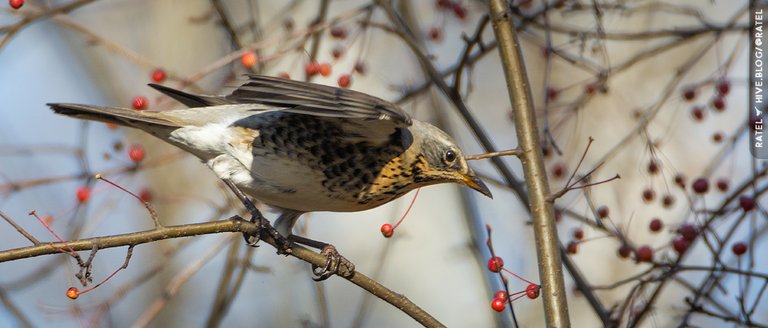
🦉 The fieldfare (Turdus pilaris)
- Turdus (lat) - Thrush
- pilaris the etymology is mysterious, although it is now believed that pilaris in later Latin means simply thrush (Jobling, 2017). However, since lat. "pilus" hair, pilare to remove hair, but pila ball, pilaris anything related to ball, and pilarius is a juggler (and at the same time, the Greek "trikhos" is hair, and "trikhas" is a thrush!), all this puzzling. Two assumptions arise. First: when the fieldfare in summer, how usually pulls earthworms out of the ground, this can be associated with hair removal (pilare). Second: when in autumn and winter the fieldberry picks rowan berries and throws them up, swallows, it may resemble a juggler (pilarius).

These noisy birds are easiest to observe in the spring. They are sedentary wintering birds, however, for example, in my region in winter they are very rare to meet because of the cold, but if the winter is warm, then you can. And in early spring there are a lot of them in the forests. It is their mating season and their behavior is completely different from that in summer.

At this time they are brave, and you can come close to them. They are busy looking for a partner, looking for their favorite worms. In the summer they are secretive and timid. And only in the fall they can be observed again. And this should be done in places where rowan grows. They feed on rowan berries in the fall and winter.

| Camera | Lens |
|---|---|
| Nikon D5200 | Tamron SP AF 150-600mm f/5-6.3 Di VC USD |
А у нас в этом году дроздов не видно. Может поближе к зиме прилетят, рябины много.
Отличное фото.
Thank you for your witness vote!
Have a !BEER on me!
To Opt-Out of my witness beer program just comment STOP below
View or trade
BEER.Hey @ratel, here is a little bit of
BEERfrom @isnochys for you. Enjoy it!Did you know that <a href='https://dcity.io/cityyou can use BEER at dCity game to buy cards to rule the world.